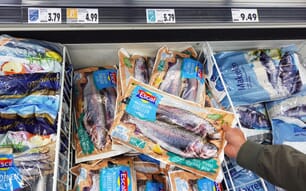The MSC achieved a score of 95.63 against criteria for credible programmes, a score that was 30 points higher than the second-place programme. The report concluded that the MSC is the only programme to be designated 'compliant' with the criteria of the evaluation.
The report finds that ‘except for the MSC, the other assessed schemes do not evaluate fisheries across all criteria to the extent required to support sustainable fishing and healthy oceans.’ As a consequence, the MSC is ranked the highest in the report. The report goes on to say that the study ‘shows the significant difference between the assessment [by] the MSC and [by] all other ecolabels especially in Governance, Standard Structures & Procedures and Content of Ecolabel Standards.’
Commissioned by WWF and carried out by independent management consultancy Accenture Development Partnerships, the report compares and ranks seven sustainable fishery certification and ecolabel programmes. The criteria used in the assessment reflect ‘best practice’ in fisheries certification and ecolabelling, with a stated aim to determine which labels have the greatest impact on improving fishery health and are sufficiently rigorous to have an effect on fisheries management.
The independent evaluation was commissioned, WWF say, to address ‘increasing demand from seafood industries and consumers for seafood to come from ‘better fisheries’, as well as the need to ‘tackle the risk of potential confusion, or worse still a lack of confidence in seafood ecolabelling amongst processors, retail seafood outlets, chefs, and the end consumer’.
To compare the relative strengths of ecolabels, the study analyses various components of sustainable fishing using 103 separate criteria taken from the most credible ecolabelling schemes accepted in international forums including the Food and Agriculture Organisation’s (FAO) 2005 guidelines for ecolabelling and standards developed by the International Social and Environmental Accreditation and Labelling Alliance (ISEAL). The assessment examines the independence, transparency, and inclusiveness of the scheme; how the scheme is governed and operated including standard setting structures and procedures; and a review of the scheme’s content and quality of standards including ecological criteria, fishery management system, and traceability.
Commenting on the report Rupert Howes, Chief Executive of the Marine Stewardship Council said: ‘I welcome this thorough and credible assessment of seafood ecolabel and certification programmes. The growth of the MSC programme is a result of the extensive design of our programme, with so many checks and balances, science-based standards, and extraordinary levels of stakeholder support and input. We recognise that no system is perfect and we will be examining the report’s findings to see if it identifies improvements that can be made.'
‘We hope that the report will be welcomed by the fishing and seafood industry, processors, retailers, governments and NGO's. This independent confirmation that the programme meets best practice should reassure all our partners and that their commitment and continued support is well placed.
Highest Scores For Seafood Ecolabels
GLOBAL - The Marine Stewardship Council (MSC) has come out on top in an independent assessment of wild capture seafood certification and ecolabel programmes.


